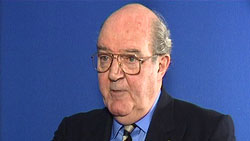 |
| Major General Mike Reynolds |
At one stage I was very depressed, after Korea, not because of Korea, although I was appalled at our inefficiency. The Army was not efficient in Korea. We seemed to have learnt nothing from the Second World War, in my view, and so when I joined the Queen's in Germany we were very much under strength, that depressed me. In Korea we were inefficient and under strength although we were at war. If I hadn't been wounded I think I probably would have left the Army, but I was wounded and came home and spent the best part of a year in and out of the Cambridge Hospital, just down the road here at Aldershot. Then the decision was, am I going to stay, and of course because of my wounds I was not actually, I shouldn't have been allowed to stay in the infantry. At one stage they said you can't, physically you won't be fit enough. The moment they said that, the decision was made for me, I'm going to stay, and so I did but I think the hardest part was, was I going to stay in the Army. That was the hardest decision I ever had to make. There were lots of others of course.
Tell me about how the Army, what lessons the Army had learnt after the Second World War and what the Army's main role was after the Second World War?
I don't think we learnt very much from the Second World War. The Army I joined was appallingly badly equipped. We didn't have a self-propelled artillery gun, we didn't have an armoured personnel carrier, we had a rifle that was the same as they had used virtually in the First World War, we had a slow firing machine gun. Our tactics were based on the drill book almost, there was no flexibility and National Service didn't help because it was a sausage machine. They came in, they did their year or their 18 months and so you couldn't progress in training you were just doing the same things over and over again, not able to develop tactics and thought and so on. So it was a very frustrating time until National Service finished but, having said that, it was the National Service men who went to Korea, it was National Service men in the Malaysian emergency and they did superbly well and of course you weren't in Korea by the time I got there, it was a static war, we advanced, then we would be pushed back by the Chinese, then we'd gone up again to where the war had started on the 38th parallel and we dug in there and we stayed there. So we were back to almost a 1914-1918 war type, so tactics didn't really matter much. Again, this is one of the reasons I was so depressed, I was in a time warp almost, and it wasn't my idea of soldiering at all. Because I was wounded I wasn't fit enough to go to Malaysia so I can't really speak for that, but the Army lurched from one crisis to the next really, I mean Suez, Malaysia, Kenya. We call it peace keeping now, we called it counter insurgency in those days, and so it was a very difficult period for the Army.